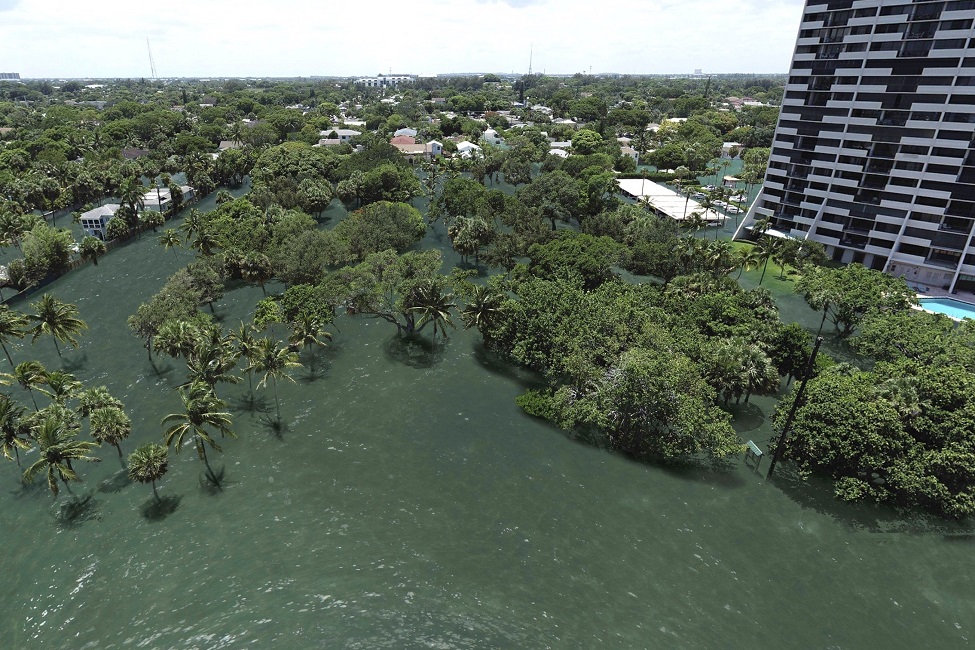FAU, Virtual Planet and City of West Palm Beach Unveil VR Experience

A virtual 3D model as seen in the virtual reality experience reveals the destruction that could occur in Osprey Park and the surrounding communities, highlighting the threat to the coastline and potential solutions for coastal areas. (Photo credit: Virtual Planet)
Virtual Planet, in partnership with Florida Atlantic University and the City of West Palm Beach, announced the launch of a revolutionary new virtual reality (VR) experience, “Sea Level Rise (SLR) Explorer WPB.” The multidisciplinary team created a virtual simulation of the devastation that a Category 5 hurricane and sea level rise could have on West Palm Beach. The simulation, produced with 3D technology, reveals the destruction that could occur in Osprey Park and the surrounding communities, highlighting the threat to the coastline and potential solutions for coastal areas.
Funded by a Florida Department of Economic Opportunity grant, the VR experience was developed by a team of experts at Virtual Planet, FAU and Stanford University’s researcher Anna Queiroz, Ph.D., who leveraged their joint expertise in computer science, planning, engineering, art and psychology to create a truly unique and engaging experience.
In collaboration with the City of West Palm Beach, the team created a virtual environment, where users can explore and interact with flooding impacts in public parks. The experience offers exciting virtual environments, interactive experiences, and immersive storytelling. The VR experience is designed to help users better understand flood risk and adaptation options. They also can enjoy a blimp ride high above the City of West Palm Beach.
The SLR Explorer WPB also demonstrates solutions that can be implemented to mitigate damage, such as raising the seawall at Osprey Park and creating new man-made islands that offer a buffer against storm surge and opportunities for additional recreation and natural habitats.
"We propose building new parks and new man-made islands out here, just like Peanut Island, which would act as a storm buffer and a wonderful park space to use every day," said John Renne, Ph.D., a professor in the Department of Urban and Regional Planning and director of the Center for Urban and Environmental Solutions within FAU’s Charles E. Schmidt College of Science.
To make this experience more accessible, SLR Explorer WPB is available in English, Spanish and Creole with closed captions.
“Climate impacts are hard to grasp. Figures on a spreadsheet or even 2D maps are no match for immersive VR simulations that let us see the water level rise and explore solutions for coastal resilience,” said Juliano Calil, Ph.D., founder and chief scientist of Virtual Planet Technologies, the developer of the experience. “We're thrilled to bring this innovative technology to the City of West Palm Beach as a new way to plan for a resilient future."
The project also includes a research component. The study will investigate how an interactive VR experience depicting the impacts of sea-level rise in West Palm Beach affects local residents' beliefs, concerns and intentions about sea-level rise and mitigation plans, compared to a 2D video of the VR experience. More than 250 participants have gone through the study to date in more than a dozen public events.
“The results will inform discussions between decision-makers, community leaders and residents on practical actions to mitigate the sea-level rise impacts at West Palm Beach,” said Queiroz, who investigates VR impacts on environmental education and climate-related behavior at Stanford University.
Last fall, Keith A. James, the mayor of the City of West Palm Beach, had the opportunity to experience first-hand the SLR Explorer WPB.
“The virtual reality experience was quite enlightening. This technology demonstrated in unambiguously clear terms the devastating impact of sea level rise on our city,” said James. “I was also impressed with the demonstration of the impact of mitigation measures that could be employed to counter the effects of sea level rise.”
To view videos of SLR Explorer WPB:
Experience trailer: vimeo.com/761603305
Virtual reality experience: www.oculus.com/experiences/quest/5273059422772542/
360 interactive videos
- English - com/virtualplanet/wpb-en
- Spanish - com/virtualplanet/wpb-es
Sea Level Rise (SLR) Explorer WPB – Trailer (Video credit: Virtual Planet)
-FAU-
Latest Research
- World's First Bench-to-Bedside MRI, Focused Ultrasound System UnveiledThe newly expanded FAU NeuroInnovate Center is the first in the world to integrate advanced MRI and focused ultrasound technologies into a single, unified platform for both preclinical and clinical research.
- Beyond the Pink Ribbon: Combating Breast Cancer in Younger WomenFAU researchers are investigating rising breast cancer in younger women. Four young survivors' stories highlight missed signs, emotional toll, and the urgent need for earlier detection and evidence-based care.
- Study: 'Man's Best Friend' Slows Cellular Aging in Female VeteransPioneering research from FAU and collaborators shows training service dogs slows biological aging in female veterans - especially those with combat experience - marking a breakthrough in mind-body health.
- Chatbots the New 'Doc?' Exploring AI in Health Behavior CoachingChanging habits is tough. AI tools like ChatGPT now simulate motivational interviewing (MI), showing promise - but can they match MI's core and spark lasting change? FAU researchers explore the potential.
- Study First to Show if Nesting Heat Affects Sea Turtle Hatchling 'IQ'FAU researchers are the first to train loggerhead sea turtle hatchlings in a maze using visual cues to test their learning and ability, and to determine if high nest temperatures impair their cognition.
- FAU Lands EPA Grant to Use Genetics in Florida Bay Sponge RestorationFunded by the U.S. EPA, the project marks the first genetic assessment of sponge recovery in the region, with broad implications for ecosystem health and economically important species like the spiny lobster.






